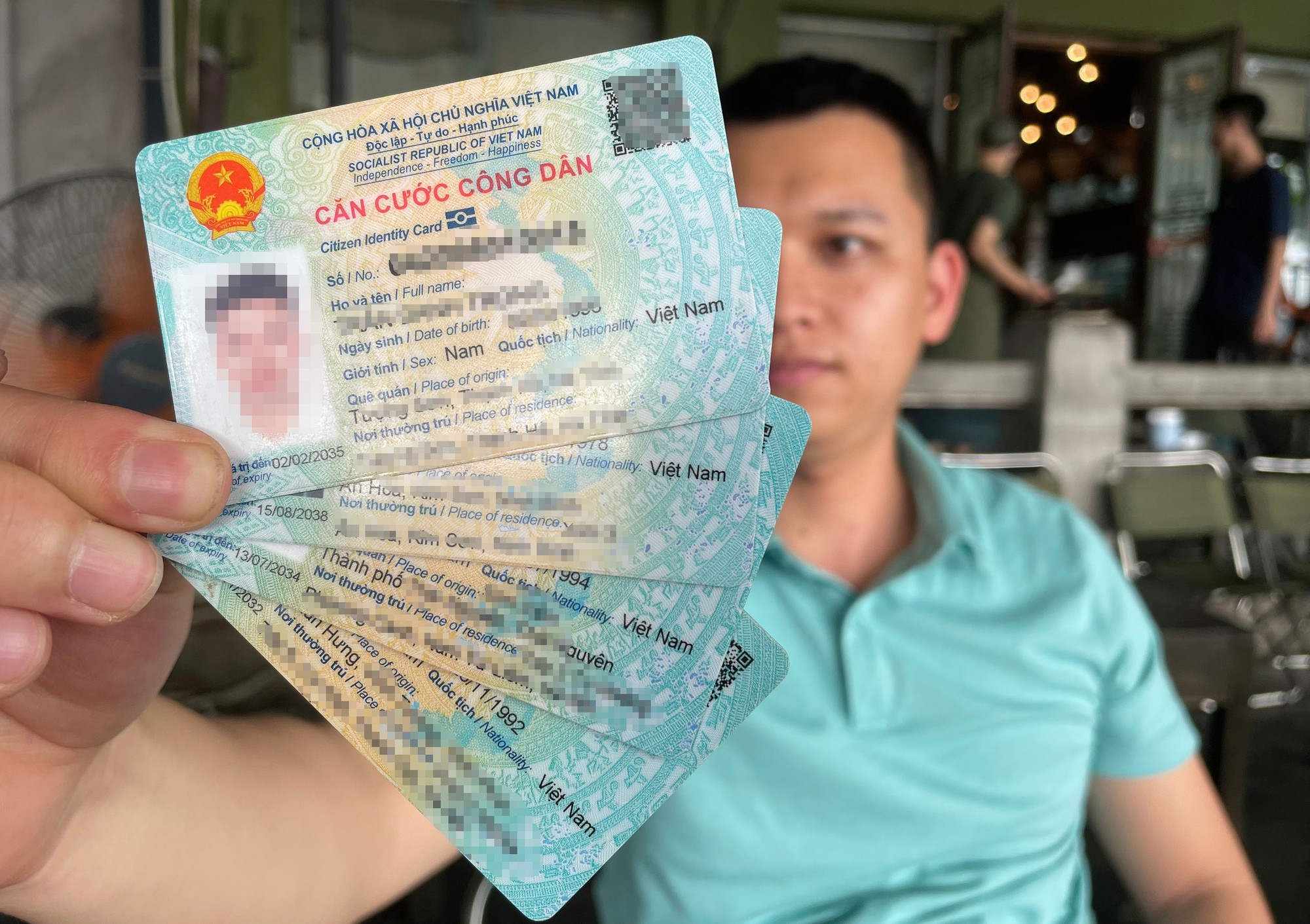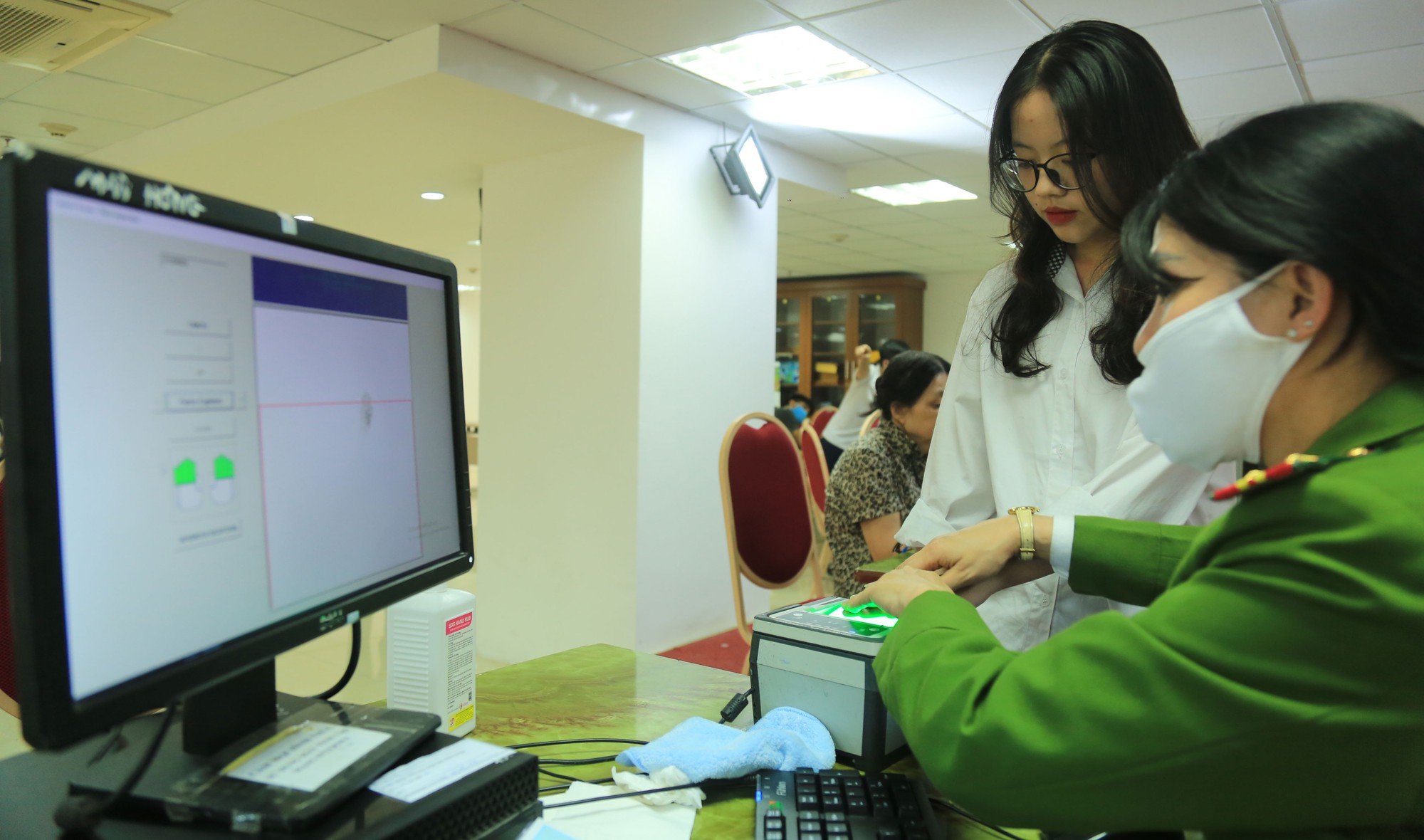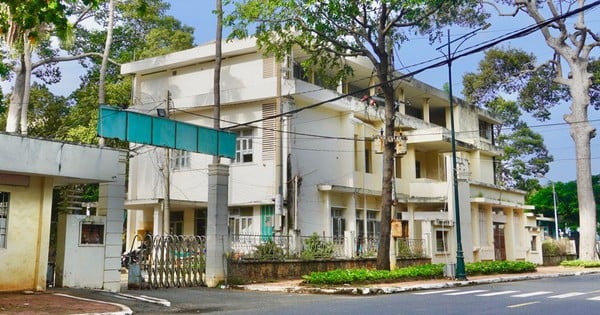This is a major turning point in the process of administrative procedure reform, towards building a digital government and digital citizens; with expectations of breakthrough utilities that focus on people and businesses.

The chip-embedded CCCD card is expected to be a "universal key" to help exploit data from the National Population Database.
To date, after more than 1 year of implementation, Project 06 has achieved a number of important results, the backbone of which is the completion of the construction and putting into operation of the National Population Database. Data from the Ministry of Public Security shows that by the end of the first quarter of 2023, the National Population Database had connected with 13 ministries and branches; 1 state-owned enterprise, 3 telecommunications enterprises and 63 localities. However, many obstacles have also appeared, causing the implementation roadmap of some goals under the project to not meet expectations.
Signed commitment for 2 years but still no data exploitation
Speaking to Thanh Nien , a leader of the People's Committee of a ward in Hanoi said that although the National Population Database officially operated from July 1, 2021, up to now, ward-level officials have not been able to exploit information from this database. "Ward officials have all signed a commitment to keep people's information confidential when exploiting data. They signed it last year, even the year before, but it has not been exploited yet," he shared.
Also according to the implementation roadmap of Project 06, the chip-embedded CCCD card will be a "universal key", helping people not to have to present integrated documents when carrying out administrative procedures, while helping officials and agencies to reduce the workload. However, according to the reflection from the ward leader, when officials scan the QR code on the chip-embedded CCCD, the information fields that appear are not complete, leading to the handling of procedures (marital status confirmation, marriage registration, birth registration, death registration, policies and regimes...) instead of being quick and convenient as desired, it becomes more time-consuming and laborious.
For example, in the case of citizens who have had multiple residences and need to confirm their marital status, officials will usually ask people (on a voluntary basis) to provide their paper household registration books (now abolished) or personal documents to compare and verify information. If they do, everything will go relatively smoothly; but if not, problems will arise.
Recently, the Department of Civil Status, Nationality and Authentication (Ministry of Justice) sent an official dispatch to the Department of Justice of provinces and centrally-run cities, stating: If it is necessary to clarify the marital status at the previous place of residence of a citizen, the civil status registration agency is responsible for proactively coordinating with the competent police agency to check and verify according to regulations, and does not require people to submit/present documents proving information about residence.
From the above spirit, the ward leader said that in case a citizen does not have relevant documents, the ward staff will proactively coordinate with the ward police to verify information about residence to determine marital status. The verification will take a lot of time, from 7 to 15 days, because "the ward People's Committee sends documents to the ward police, the ward police send documents to the district police".
That is at the ward level, and at the city level, the Hanoi People's Committee also complained about difficulties when connecting public service software encountered many problems: the system was not synchronized or synchronized for a long time, information was returned slowly or there was no response, citizens could not track the progress of the application or supplement or adjust the application as requested... In particular, the Ministry of Justice piloted the issuance of electronic copies of birth certificates and death certificates in 2 localities, including Hanoi. However, the police agency did not agree to accept them because there was no red seal.

Making CCCD with chip for people in Hanoi
Passive, lack of overall planning
Difficulties also occur in many ministries and branches, mainly focusing on infrastructure factors, implementation costs, and a huge amount of work, but coordination between units is not really smooth...
Mr. Chu Manh Sinh, Deputy General Director of Vietnam Social Security (VSS), said that Vietnam Social Security is the first unit to successfully connect with the National Population Database. A series of utilities have been exploited and served the people such as: verifying demographic information in the database managed by Vietnam Social Security; sharing and providing health insurance information records, implementing technical solutions to gradually use chip-embedded CCCD cards and VNeID applications to replace paper health insurance cards for medical examination and treatment...
However, Mr. Sinh also acknowledged that the implementation of Project 06 still has many shortcomings. Typically, the direction and implementation of some units is not thorough; the coordination between agencies is not close and timely; the modification and upgrading of software to meet procedures and regulations is still slow; the quality and efficiency in providing and using online public services as well as the number of people using them are not high. Especially, the connection and exploitation of information and data from national databases and specialized databases are still entangled.

Similarly, assigned to build the National Land Database, the Ministry of Natural Resources and Environment has so far completed the development of a solution to clean up data on land and housing information. However, according to Mr. Le Phu Ha, Director of the Department of Information Technology and Natural Resources and Environment Data, data collection has encountered many difficulties when land management work over many periods has not been fully updated, there are large differences between data of state agencies and actual land use, and it is difficult to access people's land documents (safely kept, mortgaged, etc.) to reconcile, clean up, and enrich. In addition, the funding for implementation is large but has not been arranged in a timely manner, and the conditions for information technology infrastructure are still limited (no/no server to serve the connection); connection services, data sharing, authentication and electronic identification are not operating stably, the processing speed is slow, and there are still errors...
Or from the story of more than 17 million Covid-19 vaccine injections that have not been updated due to incorrect information verification with the National Population Database, the Ministry of Health said that the implementation and construction of projects to carry out tasks under Project 06 are basically passive, due to the lack of a master plan for infrastructure development to serve digital transformation in healthcare.
In the past, specialized databases were deployed in a fragmented manner, lacking connections; and lacking the necessary data for specialized management. Information systems mainly exploited manually entered reporting data, and there were no overall management information systems for each specialized medical field. Not to mention, the technical infrastructure of server equipment, storage, connection network and network information security did not meet the requirements for implementing technical solutions. In particular, the formation of specialized databases lacked the participation of hospitals under the Ministry of Health and other ministries and branches, because most hospitals lacked the funds to implement them.
Difficult because the system is not secure
According to the representative of the National Population Data Center (Department of Administrative Police for Social Order, Ministry of Public Security), Project 06 is currently following the set roadmap. In May 2023, many positive results were achieved, such as: public services for residence notification reached 99.9%, permanent residence registration reached 89.4%, more than 1 million candidates successfully registered for the exam on the graduation exam management software...
Regarding the fact that some ministries, branches and localities complain about the difficulty in connecting and exploiting the National Population Database, the representative explained: When wanting to connect to the database, units must prepare a system to ensure security and safety. If they do not meet this criterion, they will not be able to connect.
"When a unit has prepared the system and requested to connect, we will send experts from the Cyber Security Department (Ministry of Public Security) to check. If any vulnerabilities are detected, we will propose to fix them until they are safe before connecting, to avoid bad guys taking advantage of these vulnerabilities to steal resident data," said the representative.
Therefore, the representative of the National Population Data Center suggested that ministries, branches and localities that have not yet connected to the database should soon complete the system, ensure security and safety for connection and exploitation. At the same time, ministries and branches must also proactively clean their data to facilitate connection and communication, avoiding causing inconvenience to people.
On the side of the Ministry of Public Security, this agency is still reviewing and processing legal documents to serve the implementation of Project 06, along with continuing to further improve technical and technological infrastructure, ensuring security and safety for data sharing and connection.
A good signal came from the Ministry of Construction. The representative of this ministry said that they had completed the review and assessment of the information system security for the ministry's network infrastructure and the administrative procedure settlement information system. In June 2023, the Ministry of Construction coordinated with the Ministry of Public Security to officially connect.
Previously, the Ministry of Construction coordinated with other units to conduct many rounds of checks and patch system vulnerabilities. After meeting security requirements, the Ministry of Construction issued an official request for connection, and is currently waiting for the Ministry of Public Security to provide the connection key. The process is expected to take only 2-3 days.
Notably, the Ministry of Construction also deployed a parallel system for backup purposes. If there is a problem, the system will temporarily stop connecting to the National Population Database but still ensure that the reception of administrative procedure settlement records is not interrupted.
Reduce at least 20% of information required to be declared
At the meeting on resolving difficulties and obstacles in implementing Project 06 on June 14, Deputy Prime Minister Tran Hong Ha requested ministries and branches to closely follow groups of issues and tasks, develop detailed implementation plans, and go one step ahead to promote localities.
Specifically, agencies and units must strictly receive and process online records, avoid slow or late processing of records; review, standardize, and digitize application forms and declarations in the direction of reducing at least 20% of the information that must be declared on the basis of reusing digitized data, to be completed in June 2023; accelerate the implementation of digital signatures on mobile devices; research and organize the implementation of administrative procedures regardless of administrative boundaries.
Ministries and branches need to inspect and urge localities to receive and handle interconnected administrative procedure records, especially overdue records; regularly evaluate all online public services provided on the Administrative Procedure Settlement Information System of their agencies and integrate them on the National Public Service Portal, thereby selecting practical public services with high frequency of use, closely linked to the daily needs of people and businesses.
For the two groups of interconnected public services "Birth registration - Permanent residence registration - Issuance of health insurance cards for children under 6 years old" and "Death registration - Deletion of permanent residence registration - Funeral allowance", the Deputy Prime Minister requested to complete specialized professional software, ensure smooth connection with interconnected public service software; provide professional guidance for localities to implement.
The Ministry of Public Security presides over and coordinates with ministries, branches, and localities in integrating, authenticating, and displaying personal information and documents on the VNeID application, gradually replacing the provision of personal documents in performing transactions and administrative procedures.
The Ministry of Finance develops a plan, takes the lead in coordinating with the Ministry of Public Security to focus on implementing solutions on synchronizing tax data, using citizen identification, electronic identification as tax codes and identification in electronic transactions to improve tax collection efficiency. In particular, the Ministry of Health must accelerate the implementation of assigned tasks in Project 06 such as updating data on basic health information groups into the national database on insurance to serve the implementation of electronic health books...
Source link































































Comment (0)